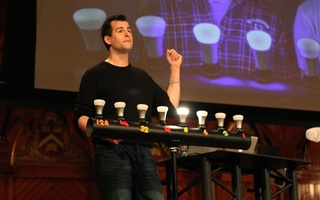Sheiber says other schools are starting to use similar systems to analyze papers in the humanities, including services offered on the Internet. One such site, plagiarism.org, does line-by-line analysis of student papers, noting passages that are similar to material currently offered on the Web.
But Sheiber says he does not expect humanities departments to express any interest in the software.
"I've had zero interest from other people on campus," he says, "To my mind, this software is not a big deal."
According to Alexander S. Aiken, associate professor of computer science at the University of California at Berkeley, high-tech cheating in computer science departments was a precursor to the ways the Internet is now being used to cheat in the humanities.
Over the last several years, online paper mills and other cheating aides have sprung up on the Internet, offering custom-written papers and essays at as much as $20 a page--a phenomenon with which Aiken says humanities departments will soon have to grapple.
"For 25 years, computer science students have been on computers and sharing infrastructure," he says. "You can look at that as a microcosm of what was going to happen when everyone got online."
Beyond the Yard
Read more in News
Gore, Bush Seal Nominations With Huge WinsRecommended Articles
-
Cut And Paste, Catch CheatersThe Internet has become the answer to cheaters’ prayers, diminishing any chance that professors might have to identify plagiarized source
-
Fighting Plagiarism, Schools Go High-TechWhat makes Kaavya Viswanathan ’08 unusual is not the fact that she plagiarized passages from another author’s work—it’s the fact
-
Pilot Program Takes Aim at PlagiarismInstructors in one sociology course will use anti-plagiarism software to catch copycats in their class, as part of a new
-
Professors Ask Computers to Catch CheatingProfessors are more widely employing algorithms, from decades-old codes to ones created by instructors, as an automated means to detect plagiarism in student assignments.
-
 Under CS50 Policy, Accused Students Likely Left in Dark
Under CS50 Policy, Accused Students Likely Left in Dark













